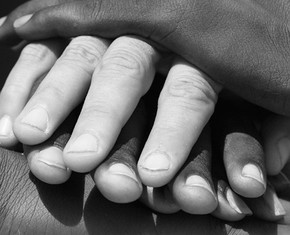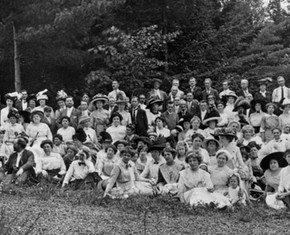The views expressed in our content reflect individual perspectives and do not represent the authoritative views of the Baha'i Faith.
Perhaps divine intervention occurred when Fred Mortensen, who’d grown from juvenile delinquent into a hardened criminal, had a Baha’i attorney, Albert Hall, assigned as his Public Defender.
Mortensen didn’t know how to read, yet Hall gave him two books, one about the Baha’i Faith, the other a dictionary. Using these two volumes, Fred taught himself to read.
Even though the gift of faith and a promise for the future had been presented, Fred hadn’t yet fully unwrapped it, and his instinct for preservation kicked in. As soon as his broken leg healed, Fred attacked a jail guard, stole his keys, and escaped. He ended up in Oakland, California where he worked at a newspaper. After experiencing an earthquake, Fred hightailed it back to the Midwest, and later moved on to the Dakotas, finding work each time with local newspapers.
RELATED: Who Is Abdul-Baha and Why Is His Station Significant?
One day, Fred rediscovered the book he’d received from Albert Hall. This time as he read, the words of Abdu’l-Baha reached deep into his being:
It is incumbent upon you to ponder in your hearts and meditate upon His words, and humbly to call upon Him, and to put away self in His heavenly Cause. These are the things that will make of you signs of guidance unto all mankind.
Unable to resist the urge to reconnect with Hall and learn more about the Baha’i Faith, after four years as a fugitive Mortensen returned to Minneapolis, knowing he’d likely be sent back to jail. To his surprise, Hall, now the District Attorney, opted not to issue an arrest warrant.
While living in Minnesota, Mortensen learned that Abdu’l-Baha had arrived in the U.S. and was due to visit Green Acre in Eliot, Maine, which owner Sarah Farmer used as a center for the study of comparative religions. He also heard there was a chance Abdu’l-Baha might not travel west, so he took off, intent on reaching Green Acre in time for his visit.
En route, he stopped in Cleveland, Ohio to attend a printers’ convention, but anxious to get to Green Acre in time to meet Abdu’l-Baha, he left before it ended. Mortensen’s funds were soon depleted. Out of money, but not out of resolve, Fred rode the rods, hobo-style – on top of and underneath the trains – never inside – with dust from the burning coal spewing forth, permeating his clothes and clinging to his skin. In his own words:
… [as] I crawled off from the top of one of its passenger trains at Portsmouth, New Hampshire, I was exceedingly happy. A boat ride, a street-car ride, and there I was, at the Gate of Paradise. My heart beating double-time, I stepped onto the soil of that to-be-famous center tired, dirty, and wondering, but happy.
In a hurry to reach his destination just across the river in Eliot, Maine, and with no money at his disposal, Fred arrived in a disheveled state, covered in soot and smelling like the rail cars on which he’d traveled. Even with a letter of introduction from Albert Hall, efforts were made to turn him away. Two of the women, Mrs. Kinney and Barbara Fitting, ignored the vigorous protests of the men and invited Fred in, gave him the opportunity to wash up, and offered him a bed for the night.
Informed that Abdu’l-Baha’s schedule was already full so there’d be no chance of an audience for him, Fred went anyway and signed the appointment ledger. At the end of the first interview of the day, Mortensen was stunned when told he would be received next. He said:
Why, I nearly wilted. I wasn’t ready. I hadn’t expected to be called until the very last thing. I had to go, and it was a strange feeling in my heart and wondering what would happen next.
After first inquiring after Fred’s health, Abdu’l-Baha asked about his trip to Green Acre, requesting specifics. Fred tried to avoid the subject, but Abdu’l-Baha would not relent. Mortensen realized that somehow Abdu’l-Baha must already know, so he reluctantly told him the true story.
Mahmud’s Diary, a translator’s record of Abdu’l-Baha’s visit to North America, states: “He explained everything about his journey to the Master, who then told him, ‘You are my guest.’”
Awed at the time and then again at the memory, Mortensen later wrote of the encounter:
A wondrous light seemed to pour out. It was the light of love and I felt relieved and very much happier. He gave me much fruit, and kissed the dirty hat I wore, which had become soiled on my trip to see Him.
According to Mortensen’s great-grandson Justin Charles Martin Penoyer:
Fred often spoke of the great amount of fruit Abdu’l-Baha gave him during their conversation. As soon as he finished one piece, he was given another. He would later say he had never eaten so much fruit in one day. Interestingly, the day before Fred’s arrival at Green Acre, Abdu’l-Baha asked one of His interpreters to buy a basket of fruit, as he was expecting a special guest to arrive the next day.
Mortensen joined the others to see Abdu’l-Baha off the following morning. As the car passed Fred, it stopped suddenly and Abdu’l-Baha himself reached out and pulled the startled man in, inviting Fred to spend the week with him in Malden, Massachusetts, the next stop on the itinerary. Penoyer tells us:
Unfortunately, what transpired between them during this time is unknown. What is known, however, is that Abdu’l-Baha and Fred became close friends for the remainder of their lives. Abdu’l-Baha often referred to Fred as “my son.” Such an appellation was very rare for Abdu’l-Baha to make. They met again briefly a few weeks later, when Abdu’l-Baha, on His way to Chicago, requested a detour to Minneapolis. This was unusual in that there was only a small Baha’i community there at the time. Fred, Albert Hall, and Abdu’l-Baha spent the day together, the last time they would meet in person.
RELATED: Am I a Baha’i?
Fred Mortensen’s life was forever changed after that experience. He later wrote:
These events are engraved upon the tablet of my heart and I love every moment of them. The words of Baha’u’llah are my food, my drink, and my life. I have no other aim than to be of service to His Pathway and to be obedient to His Covenant.
In the final essay of this series, we’ll see how the leopard changed not only his outer but his inner spots, and we’ll learn how the spiritually transformed Fred Mortensen lived his life going forward — in a 180-degree shift from his youth.
















Comments
Sign in or create an account
Continue with Googleor